International journal of nursing sciences
VerifiedAdded on 2022/09/01
|13
|3596
|26
AI Summary
Contribute Materials
Your contribution can guide someone’s learning journey. Share your
documents today.
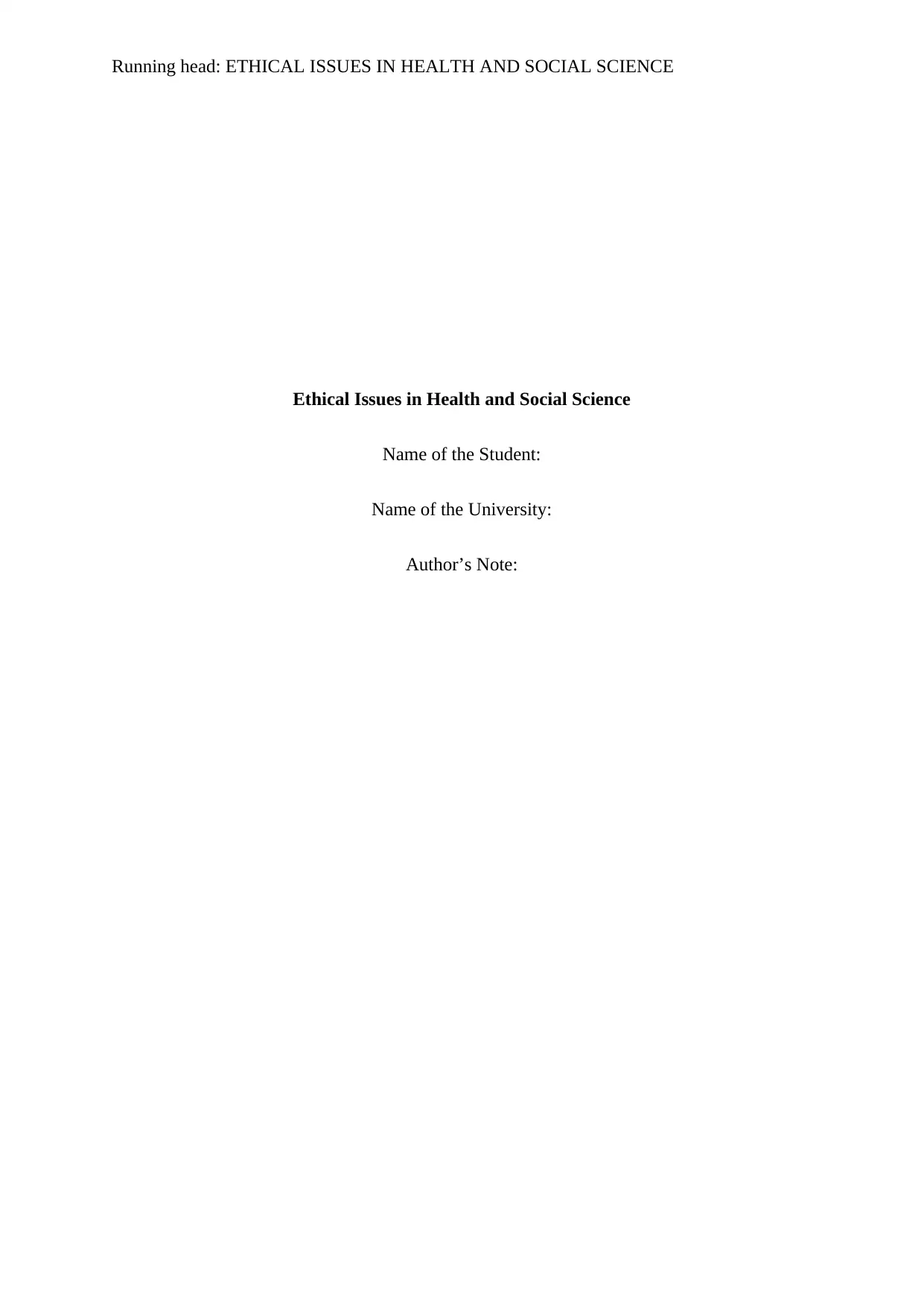
Running head: ETHICAL ISSUES IN HEALTH AND SOCIAL SCIENCE
Ethical Issues in Health and Social Science
Name of the Student:
Name of the University:
Author’s Note:
Ethical Issues in Health and Social Science
Name of the Student:
Name of the University:
Author’s Note:
Secure Best Marks with AI Grader
Need help grading? Try our AI Grader for instant feedback on your assignments.
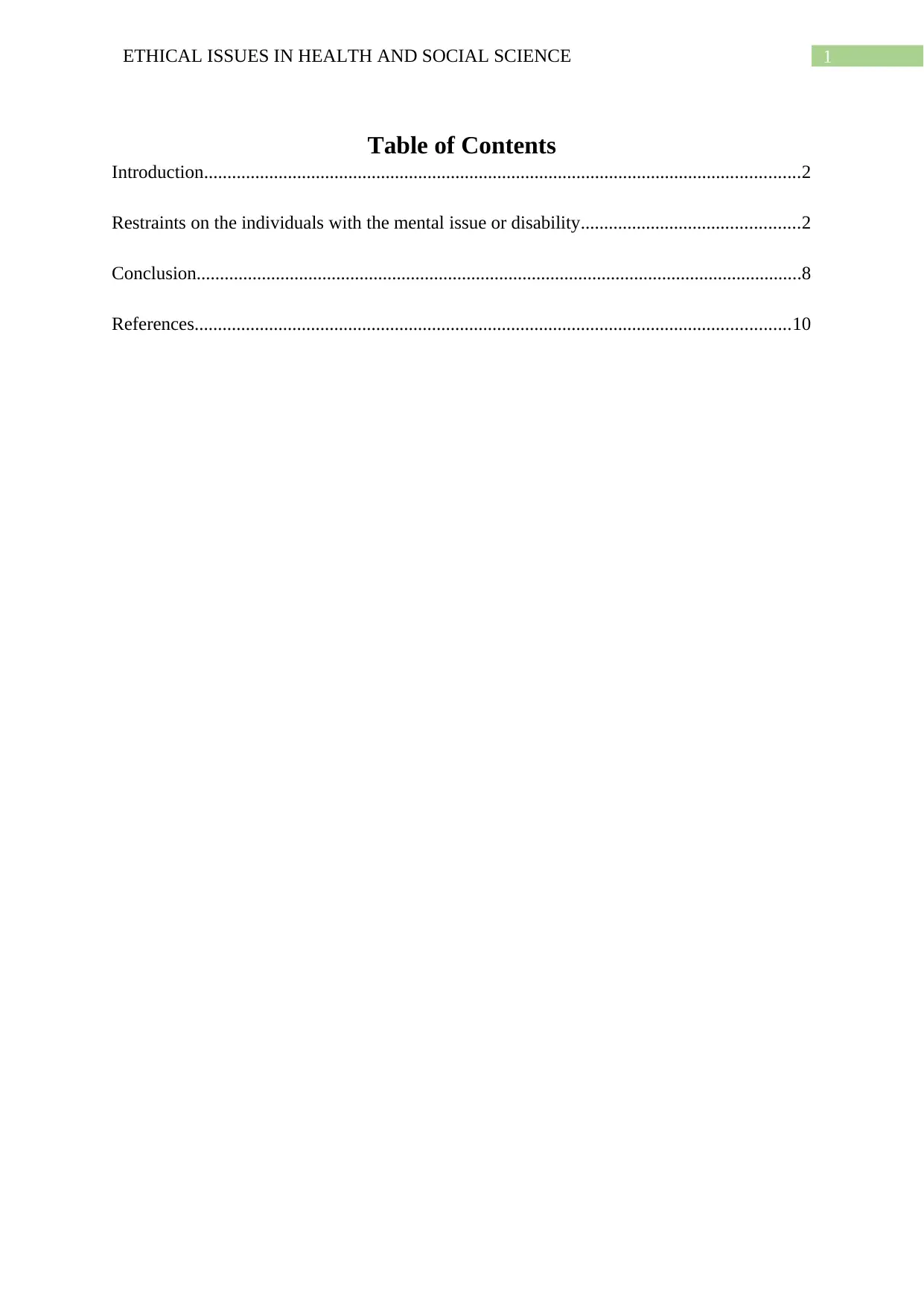
1ETHICAL ISSUES IN HEALTH AND SOCIAL SCIENCE
Table of Contents
Introduction................................................................................................................................2
Restraints on the individuals with the mental issue or disability...............................................2
Conclusion..................................................................................................................................8
References................................................................................................................................10
Table of Contents
Introduction................................................................................................................................2
Restraints on the individuals with the mental issue or disability...............................................2
Conclusion..................................................................................................................................8
References................................................................................................................................10
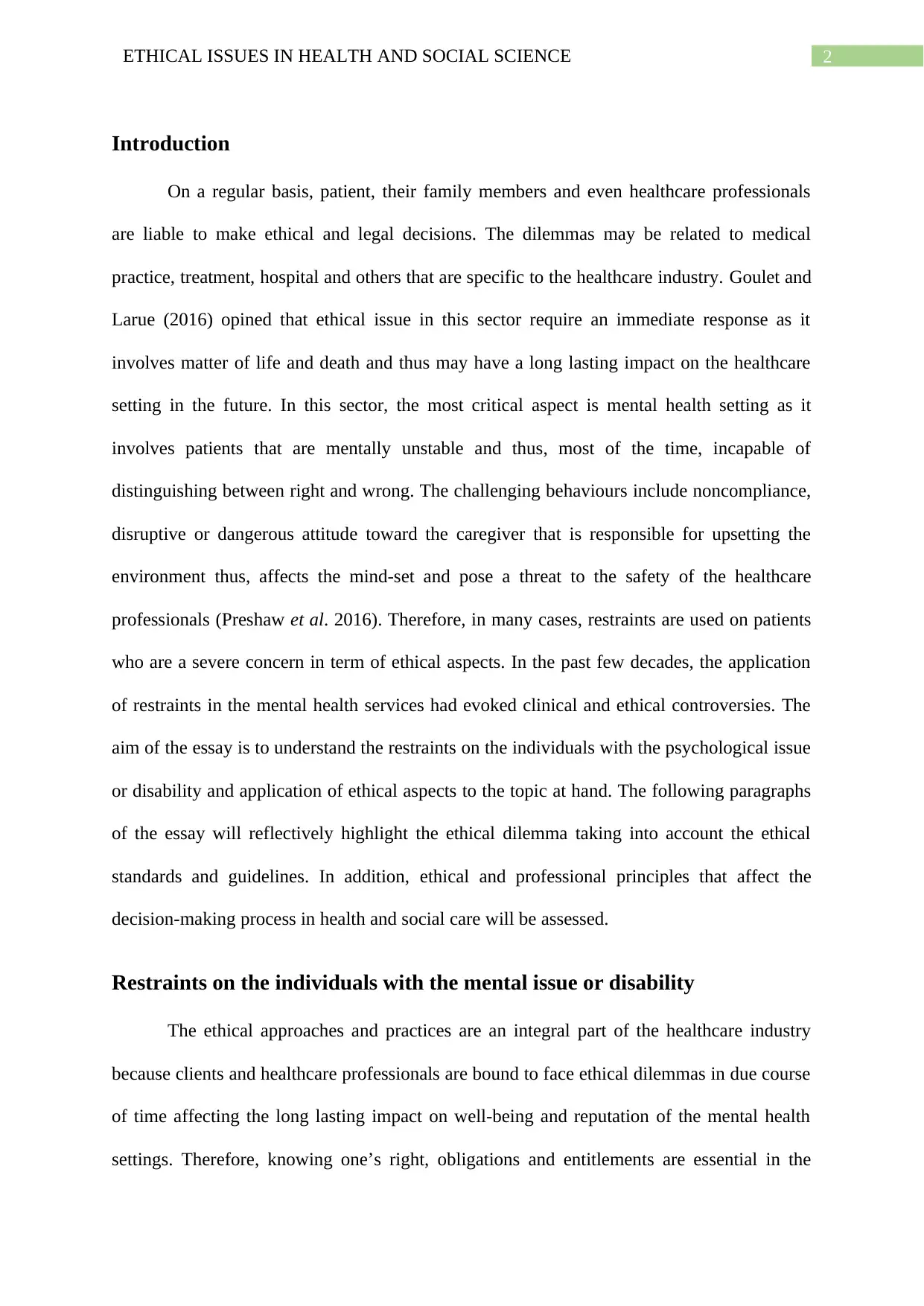
2ETHICAL ISSUES IN HEALTH AND SOCIAL SCIENCE
Introduction
On a regular basis, patient, their family members and even healthcare professionals
are liable to make ethical and legal decisions. The dilemmas may be related to medical
practice, treatment, hospital and others that are specific to the healthcare industry. Goulet and
Larue (2016) opined that ethical issue in this sector require an immediate response as it
involves matter of life and death and thus may have a long lasting impact on the healthcare
setting in the future. In this sector, the most critical aspect is mental health setting as it
involves patients that are mentally unstable and thus, most of the time, incapable of
distinguishing between right and wrong. The challenging behaviours include noncompliance,
disruptive or dangerous attitude toward the caregiver that is responsible for upsetting the
environment thus, affects the mind-set and pose a threat to the safety of the healthcare
professionals (Preshaw et al. 2016). Therefore, in many cases, restraints are used on patients
who are a severe concern in term of ethical aspects. In the past few decades, the application
of restraints in the mental health services had evoked clinical and ethical controversies. The
aim of the essay is to understand the restraints on the individuals with the psychological issue
or disability and application of ethical aspects to the topic at hand. The following paragraphs
of the essay will reflectively highlight the ethical dilemma taking into account the ethical
standards and guidelines. In addition, ethical and professional principles that affect the
decision-making process in health and social care will be assessed.
Restraints on the individuals with the mental issue or disability
The ethical approaches and practices are an integral part of the healthcare industry
because clients and healthcare professionals are bound to face ethical dilemmas in due course
of time affecting the long lasting impact on well-being and reputation of the mental health
settings. Therefore, knowing one’s right, obligations and entitlements are essential in the
Introduction
On a regular basis, patient, their family members and even healthcare professionals
are liable to make ethical and legal decisions. The dilemmas may be related to medical
practice, treatment, hospital and others that are specific to the healthcare industry. Goulet and
Larue (2016) opined that ethical issue in this sector require an immediate response as it
involves matter of life and death and thus may have a long lasting impact on the healthcare
setting in the future. In this sector, the most critical aspect is mental health setting as it
involves patients that are mentally unstable and thus, most of the time, incapable of
distinguishing between right and wrong. The challenging behaviours include noncompliance,
disruptive or dangerous attitude toward the caregiver that is responsible for upsetting the
environment thus, affects the mind-set and pose a threat to the safety of the healthcare
professionals (Preshaw et al. 2016). Therefore, in many cases, restraints are used on patients
who are a severe concern in term of ethical aspects. In the past few decades, the application
of restraints in the mental health services had evoked clinical and ethical controversies. The
aim of the essay is to understand the restraints on the individuals with the psychological issue
or disability and application of ethical aspects to the topic at hand. The following paragraphs
of the essay will reflectively highlight the ethical dilemma taking into account the ethical
standards and guidelines. In addition, ethical and professional principles that affect the
decision-making process in health and social care will be assessed.
Restraints on the individuals with the mental issue or disability
The ethical approaches and practices are an integral part of the healthcare industry
because clients and healthcare professionals are bound to face ethical dilemmas in due course
of time affecting the long lasting impact on well-being and reputation of the mental health
settings. Therefore, knowing one’s right, obligations and entitlements are essential in the
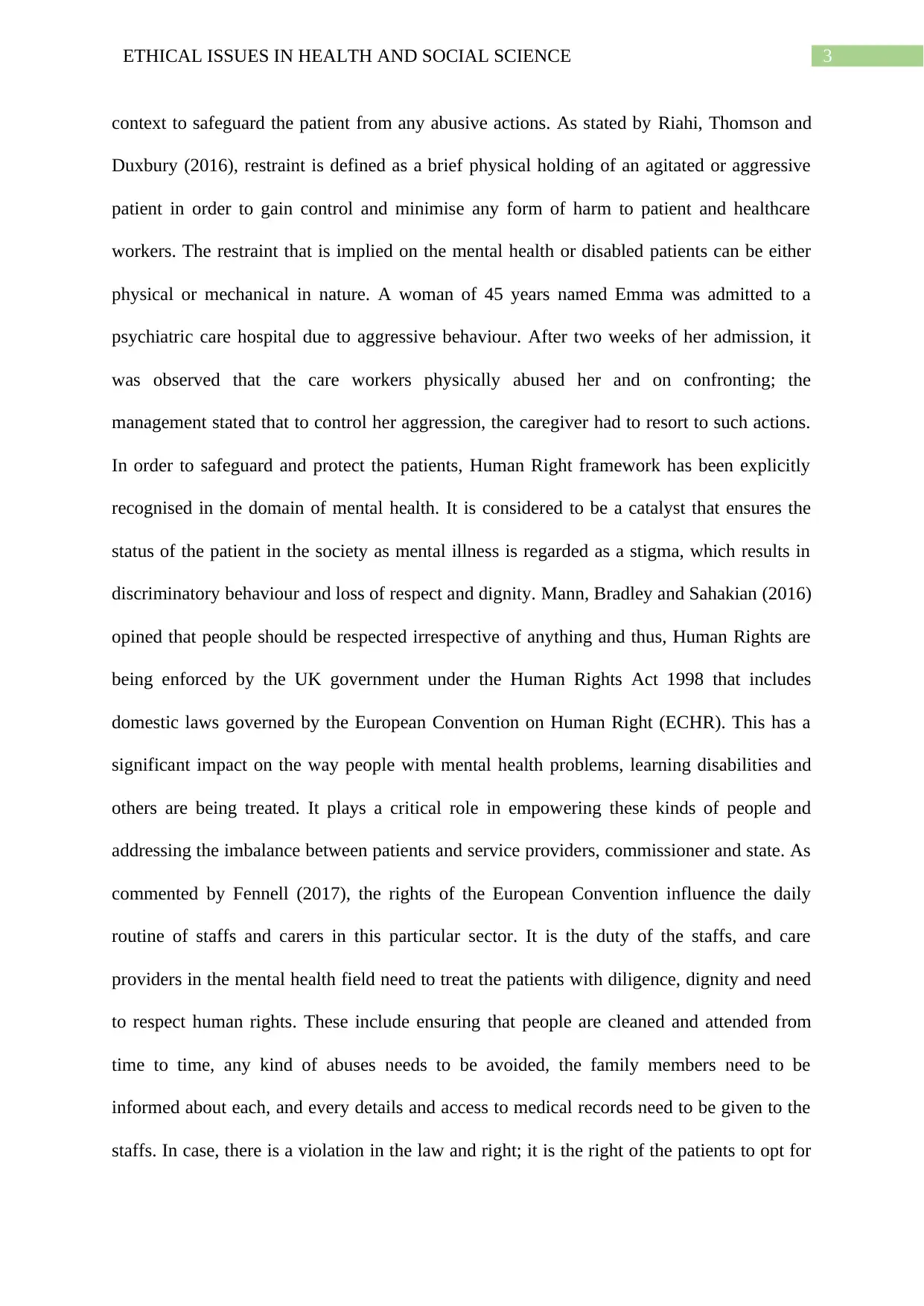
3ETHICAL ISSUES IN HEALTH AND SOCIAL SCIENCE
context to safeguard the patient from any abusive actions. As stated by Riahi, Thomson and
Duxbury (2016), restraint is defined as a brief physical holding of an agitated or aggressive
patient in order to gain control and minimise any form of harm to patient and healthcare
workers. The restraint that is implied on the mental health or disabled patients can be either
physical or mechanical in nature. A woman of 45 years named Emma was admitted to a
psychiatric care hospital due to aggressive behaviour. After two weeks of her admission, it
was observed that the care workers physically abused her and on confronting; the
management stated that to control her aggression, the caregiver had to resort to such actions.
In order to safeguard and protect the patients, Human Right framework has been explicitly
recognised in the domain of mental health. It is considered to be a catalyst that ensures the
status of the patient in the society as mental illness is regarded as a stigma, which results in
discriminatory behaviour and loss of respect and dignity. Mann, Bradley and Sahakian (2016)
opined that people should be respected irrespective of anything and thus, Human Rights are
being enforced by the UK government under the Human Rights Act 1998 that includes
domestic laws governed by the European Convention on Human Right (ECHR). This has a
significant impact on the way people with mental health problems, learning disabilities and
others are being treated. It plays a critical role in empowering these kinds of people and
addressing the imbalance between patients and service providers, commissioner and state. As
commented by Fennell (2017), the rights of the European Convention influence the daily
routine of staffs and carers in this particular sector. It is the duty of the staffs, and care
providers in the mental health field need to treat the patients with diligence, dignity and need
to respect human rights. These include ensuring that people are cleaned and attended from
time to time, any kind of abuses needs to be avoided, the family members need to be
informed about each, and every details and access to medical records need to be given to the
staffs. In case, there is a violation in the law and right; it is the right of the patients to opt for
context to safeguard the patient from any abusive actions. As stated by Riahi, Thomson and
Duxbury (2016), restraint is defined as a brief physical holding of an agitated or aggressive
patient in order to gain control and minimise any form of harm to patient and healthcare
workers. The restraint that is implied on the mental health or disabled patients can be either
physical or mechanical in nature. A woman of 45 years named Emma was admitted to a
psychiatric care hospital due to aggressive behaviour. After two weeks of her admission, it
was observed that the care workers physically abused her and on confronting; the
management stated that to control her aggression, the caregiver had to resort to such actions.
In order to safeguard and protect the patients, Human Right framework has been explicitly
recognised in the domain of mental health. It is considered to be a catalyst that ensures the
status of the patient in the society as mental illness is regarded as a stigma, which results in
discriminatory behaviour and loss of respect and dignity. Mann, Bradley and Sahakian (2016)
opined that people should be respected irrespective of anything and thus, Human Rights are
being enforced by the UK government under the Human Rights Act 1998 that includes
domestic laws governed by the European Convention on Human Right (ECHR). This has a
significant impact on the way people with mental health problems, learning disabilities and
others are being treated. It plays a critical role in empowering these kinds of people and
addressing the imbalance between patients and service providers, commissioner and state. As
commented by Fennell (2017), the rights of the European Convention influence the daily
routine of staffs and carers in this particular sector. It is the duty of the staffs, and care
providers in the mental health field need to treat the patients with diligence, dignity and need
to respect human rights. These include ensuring that people are cleaned and attended from
time to time, any kind of abuses needs to be avoided, the family members need to be
informed about each, and every details and access to medical records need to be given to the
staffs. In case, there is a violation in the law and right; it is the right of the patients to opt for
Secure Best Marks with AI Grader
Need help grading? Try our AI Grader for instant feedback on your assignments.
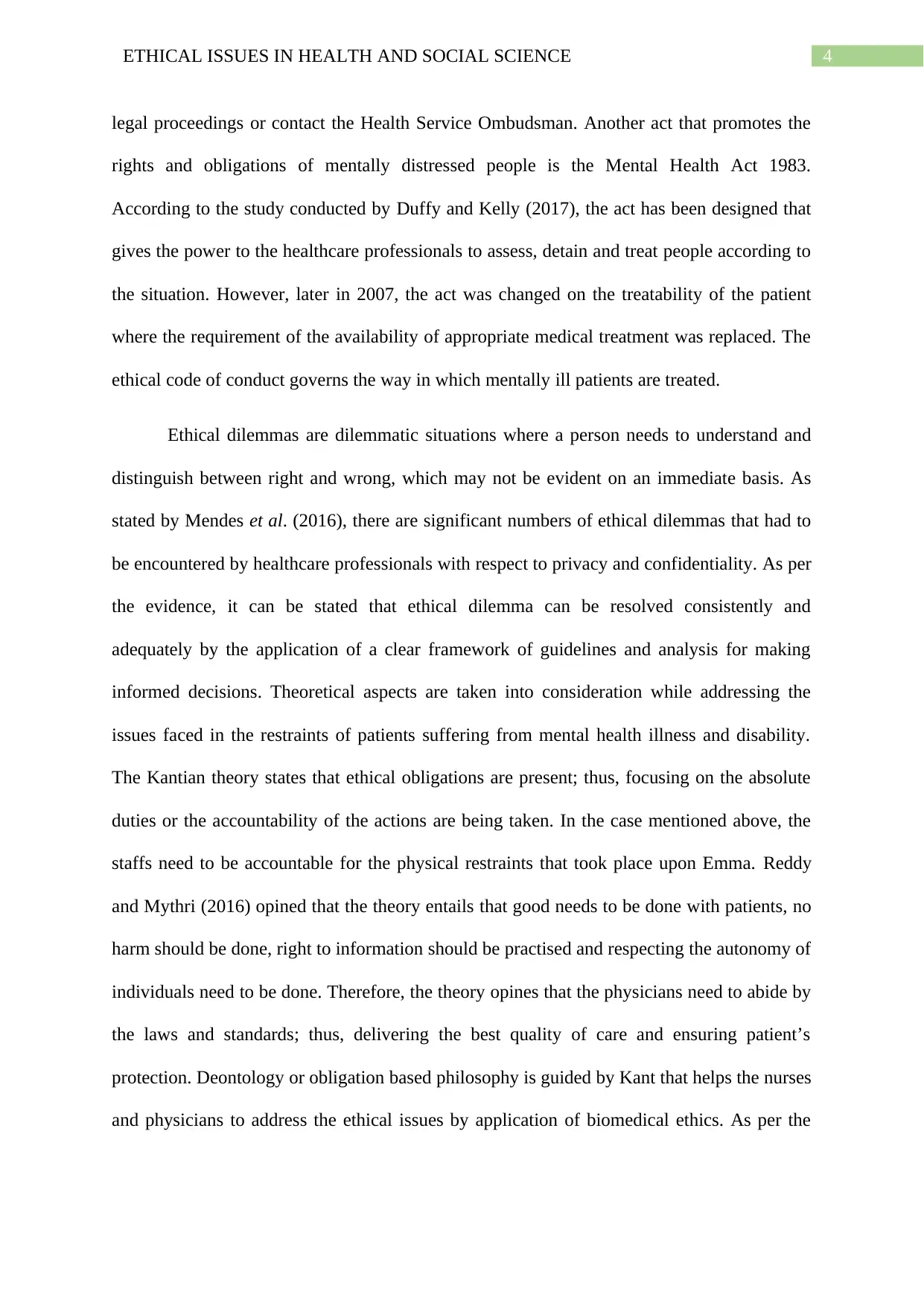
4ETHICAL ISSUES IN HEALTH AND SOCIAL SCIENCE
legal proceedings or contact the Health Service Ombudsman. Another act that promotes the
rights and obligations of mentally distressed people is the Mental Health Act 1983.
According to the study conducted by Duffy and Kelly (2017), the act has been designed that
gives the power to the healthcare professionals to assess, detain and treat people according to
the situation. However, later in 2007, the act was changed on the treatability of the patient
where the requirement of the availability of appropriate medical treatment was replaced. The
ethical code of conduct governs the way in which mentally ill patients are treated.
Ethical dilemmas are dilemmatic situations where a person needs to understand and
distinguish between right and wrong, which may not be evident on an immediate basis. As
stated by Mendes et al. (2016), there are significant numbers of ethical dilemmas that had to
be encountered by healthcare professionals with respect to privacy and confidentiality. As per
the evidence, it can be stated that ethical dilemma can be resolved consistently and
adequately by the application of a clear framework of guidelines and analysis for making
informed decisions. Theoretical aspects are taken into consideration while addressing the
issues faced in the restraints of patients suffering from mental health illness and disability.
The Kantian theory states that ethical obligations are present; thus, focusing on the absolute
duties or the accountability of the actions are being taken. In the case mentioned above, the
staffs need to be accountable for the physical restraints that took place upon Emma. Reddy
and Mythri (2016) opined that the theory entails that good needs to be done with patients, no
harm should be done, right to information should be practised and respecting the autonomy of
individuals need to be done. Therefore, the theory opines that the physicians need to abide by
the laws and standards; thus, delivering the best quality of care and ensuring patient’s
protection. Deontology or obligation based philosophy is guided by Kant that helps the nurses
and physicians to address the ethical issues by application of biomedical ethics. As per the
legal proceedings or contact the Health Service Ombudsman. Another act that promotes the
rights and obligations of mentally distressed people is the Mental Health Act 1983.
According to the study conducted by Duffy and Kelly (2017), the act has been designed that
gives the power to the healthcare professionals to assess, detain and treat people according to
the situation. However, later in 2007, the act was changed on the treatability of the patient
where the requirement of the availability of appropriate medical treatment was replaced. The
ethical code of conduct governs the way in which mentally ill patients are treated.
Ethical dilemmas are dilemmatic situations where a person needs to understand and
distinguish between right and wrong, which may not be evident on an immediate basis. As
stated by Mendes et al. (2016), there are significant numbers of ethical dilemmas that had to
be encountered by healthcare professionals with respect to privacy and confidentiality. As per
the evidence, it can be stated that ethical dilemma can be resolved consistently and
adequately by the application of a clear framework of guidelines and analysis for making
informed decisions. Theoretical aspects are taken into consideration while addressing the
issues faced in the restraints of patients suffering from mental health illness and disability.
The Kantian theory states that ethical obligations are present; thus, focusing on the absolute
duties or the accountability of the actions are being taken. In the case mentioned above, the
staffs need to be accountable for the physical restraints that took place upon Emma. Reddy
and Mythri (2016) opined that the theory entails that good needs to be done with patients, no
harm should be done, right to information should be practised and respecting the autonomy of
individuals need to be done. Therefore, the theory opines that the physicians need to abide by
the laws and standards; thus, delivering the best quality of care and ensuring patient’s
protection. Deontology or obligation based philosophy is guided by Kant that helps the nurses
and physicians to address the ethical issues by application of biomedical ethics. As per the
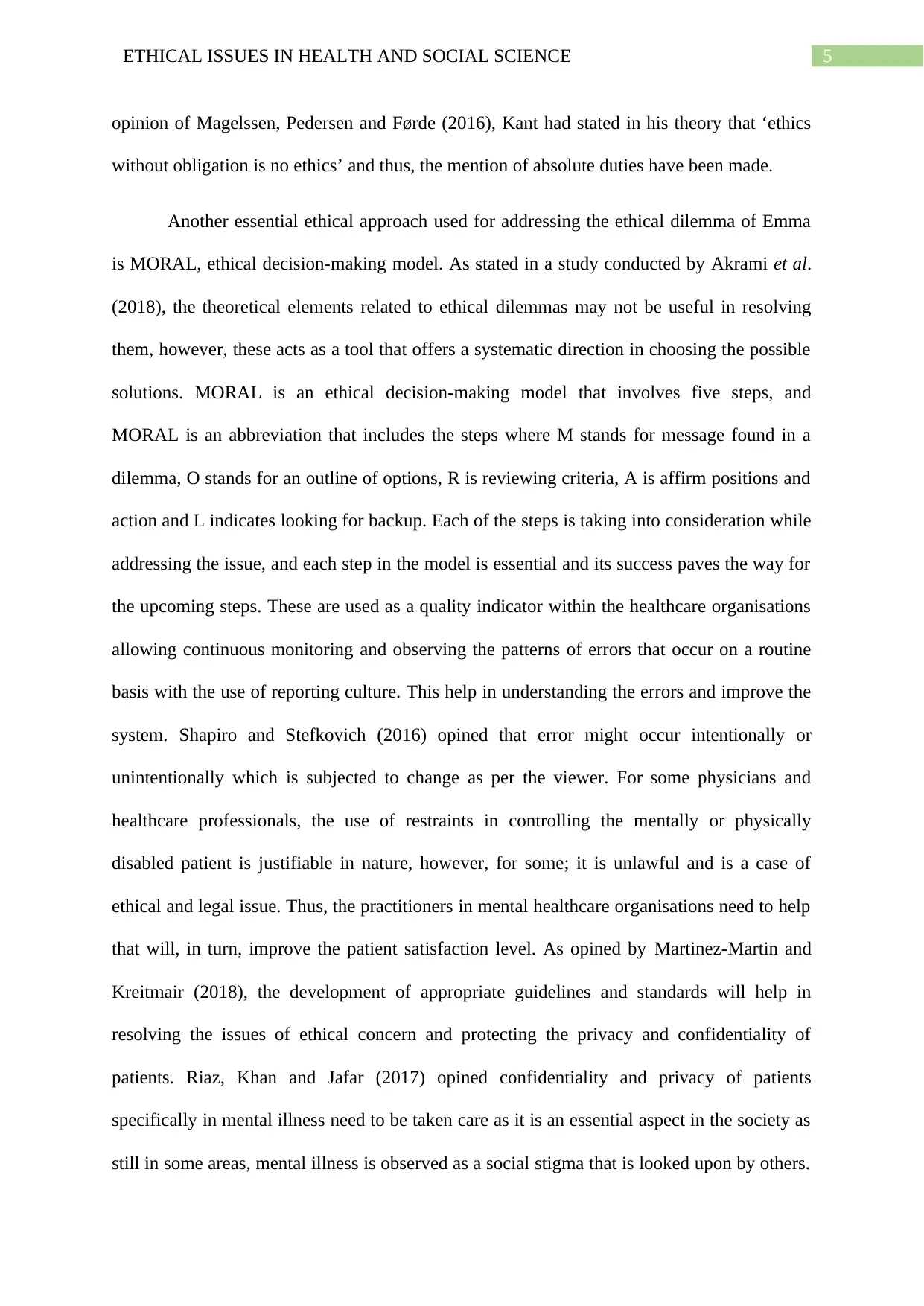
5ETHICAL ISSUES IN HEALTH AND SOCIAL SCIENCE
opinion of Magelssen, Pedersen and Førde (2016), Kant had stated in his theory that ‘ethics
without obligation is no ethics’ and thus, the mention of absolute duties have been made.
Another essential ethical approach used for addressing the ethical dilemma of Emma
is MORAL, ethical decision-making model. As stated in a study conducted by Akrami et al.
(2018), the theoretical elements related to ethical dilemmas may not be useful in resolving
them, however, these acts as a tool that offers a systematic direction in choosing the possible
solutions. MORAL is an ethical decision-making model that involves five steps, and
MORAL is an abbreviation that includes the steps where M stands for message found in a
dilemma, O stands for an outline of options, R is reviewing criteria, A is affirm positions and
action and L indicates looking for backup. Each of the steps is taking into consideration while
addressing the issue, and each step in the model is essential and its success paves the way for
the upcoming steps. These are used as a quality indicator within the healthcare organisations
allowing continuous monitoring and observing the patterns of errors that occur on a routine
basis with the use of reporting culture. This help in understanding the errors and improve the
system. Shapiro and Stefkovich (2016) opined that error might occur intentionally or
unintentionally which is subjected to change as per the viewer. For some physicians and
healthcare professionals, the use of restraints in controlling the mentally or physically
disabled patient is justifiable in nature, however, for some; it is unlawful and is a case of
ethical and legal issue. Thus, the practitioners in mental healthcare organisations need to help
that will, in turn, improve the patient satisfaction level. As opined by Martinez-Martin and
Kreitmair (2018), the development of appropriate guidelines and standards will help in
resolving the issues of ethical concern and protecting the privacy and confidentiality of
patients. Riaz, Khan and Jafar (2017) opined confidentiality and privacy of patients
specifically in mental illness need to be taken care as it is an essential aspect in the society as
still in some areas, mental illness is observed as a social stigma that is looked upon by others.
opinion of Magelssen, Pedersen and Førde (2016), Kant had stated in his theory that ‘ethics
without obligation is no ethics’ and thus, the mention of absolute duties have been made.
Another essential ethical approach used for addressing the ethical dilemma of Emma
is MORAL, ethical decision-making model. As stated in a study conducted by Akrami et al.
(2018), the theoretical elements related to ethical dilemmas may not be useful in resolving
them, however, these acts as a tool that offers a systematic direction in choosing the possible
solutions. MORAL is an ethical decision-making model that involves five steps, and
MORAL is an abbreviation that includes the steps where M stands for message found in a
dilemma, O stands for an outline of options, R is reviewing criteria, A is affirm positions and
action and L indicates looking for backup. Each of the steps is taking into consideration while
addressing the issue, and each step in the model is essential and its success paves the way for
the upcoming steps. These are used as a quality indicator within the healthcare organisations
allowing continuous monitoring and observing the patterns of errors that occur on a routine
basis with the use of reporting culture. This help in understanding the errors and improve the
system. Shapiro and Stefkovich (2016) opined that error might occur intentionally or
unintentionally which is subjected to change as per the viewer. For some physicians and
healthcare professionals, the use of restraints in controlling the mentally or physically
disabled patient is justifiable in nature, however, for some; it is unlawful and is a case of
ethical and legal issue. Thus, the practitioners in mental healthcare organisations need to help
that will, in turn, improve the patient satisfaction level. As opined by Martinez-Martin and
Kreitmair (2018), the development of appropriate guidelines and standards will help in
resolving the issues of ethical concern and protecting the privacy and confidentiality of
patients. Riaz, Khan and Jafar (2017) opined confidentiality and privacy of patients
specifically in mental illness need to be taken care as it is an essential aspect in the society as
still in some areas, mental illness is observed as a social stigma that is looked upon by others.
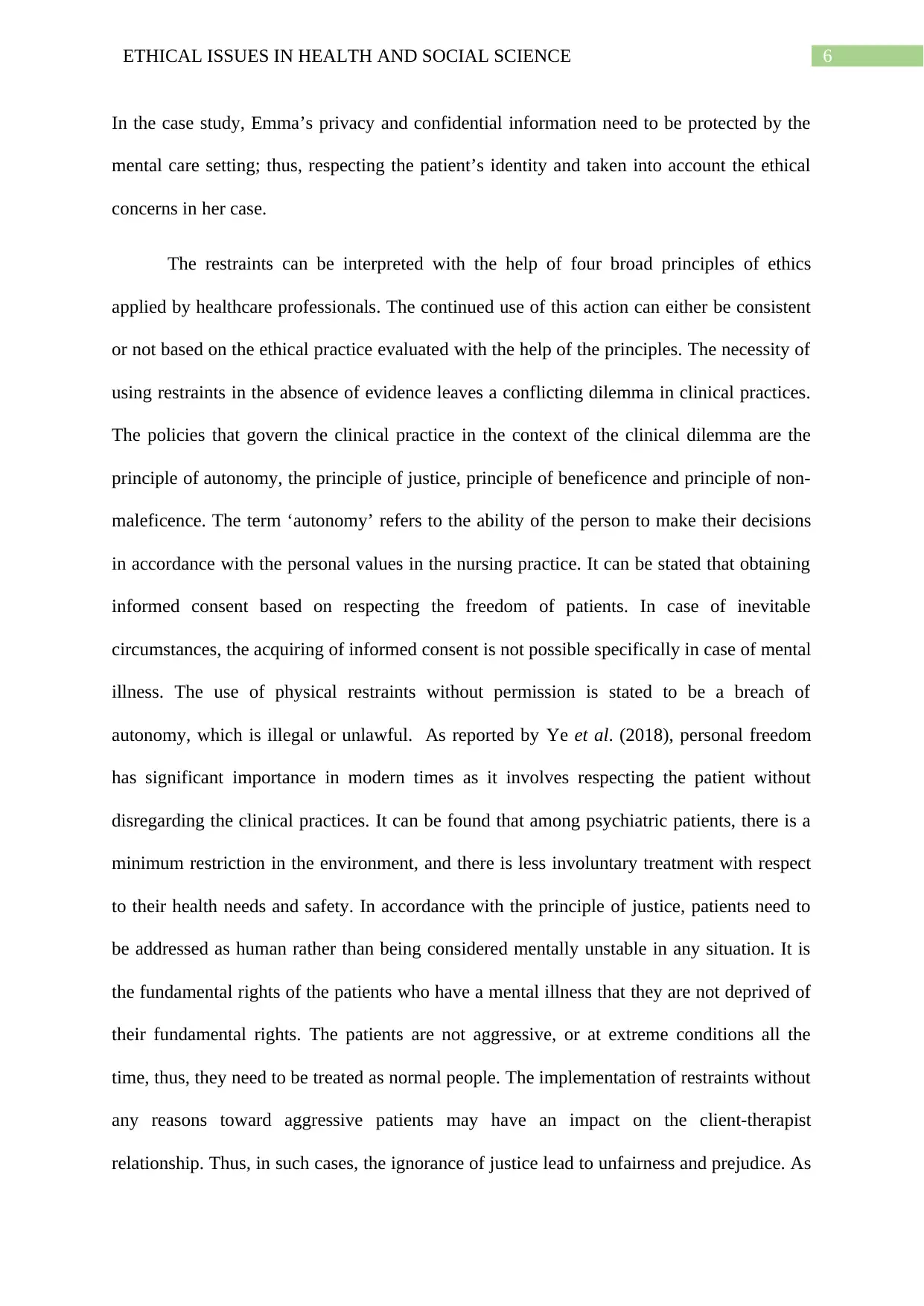
6ETHICAL ISSUES IN HEALTH AND SOCIAL SCIENCE
In the case study, Emma’s privacy and confidential information need to be protected by the
mental care setting; thus, respecting the patient’s identity and taken into account the ethical
concerns in her case.
The restraints can be interpreted with the help of four broad principles of ethics
applied by healthcare professionals. The continued use of this action can either be consistent
or not based on the ethical practice evaluated with the help of the principles. The necessity of
using restraints in the absence of evidence leaves a conflicting dilemma in clinical practices.
The policies that govern the clinical practice in the context of the clinical dilemma are the
principle of autonomy, the principle of justice, principle of beneficence and principle of non-
maleficence. The term ‘autonomy’ refers to the ability of the person to make their decisions
in accordance with the personal values in the nursing practice. It can be stated that obtaining
informed consent based on respecting the freedom of patients. In case of inevitable
circumstances, the acquiring of informed consent is not possible specifically in case of mental
illness. The use of physical restraints without permission is stated to be a breach of
autonomy, which is illegal or unlawful. As reported by Ye et al. (2018), personal freedom
has significant importance in modern times as it involves respecting the patient without
disregarding the clinical practices. It can be found that among psychiatric patients, there is a
minimum restriction in the environment, and there is less involuntary treatment with respect
to their health needs and safety. In accordance with the principle of justice, patients need to
be addressed as human rather than being considered mentally unstable in any situation. It is
the fundamental rights of the patients who have a mental illness that they are not deprived of
their fundamental rights. The patients are not aggressive, or at extreme conditions all the
time, thus, they need to be treated as normal people. The implementation of restraints without
any reasons toward aggressive patients may have an impact on the client-therapist
relationship. Thus, in such cases, the ignorance of justice lead to unfairness and prejudice. As
In the case study, Emma’s privacy and confidential information need to be protected by the
mental care setting; thus, respecting the patient’s identity and taken into account the ethical
concerns in her case.
The restraints can be interpreted with the help of four broad principles of ethics
applied by healthcare professionals. The continued use of this action can either be consistent
or not based on the ethical practice evaluated with the help of the principles. The necessity of
using restraints in the absence of evidence leaves a conflicting dilemma in clinical practices.
The policies that govern the clinical practice in the context of the clinical dilemma are the
principle of autonomy, the principle of justice, principle of beneficence and principle of non-
maleficence. The term ‘autonomy’ refers to the ability of the person to make their decisions
in accordance with the personal values in the nursing practice. It can be stated that obtaining
informed consent based on respecting the freedom of patients. In case of inevitable
circumstances, the acquiring of informed consent is not possible specifically in case of mental
illness. The use of physical restraints without permission is stated to be a breach of
autonomy, which is illegal or unlawful. As reported by Ye et al. (2018), personal freedom
has significant importance in modern times as it involves respecting the patient without
disregarding the clinical practices. It can be found that among psychiatric patients, there is a
minimum restriction in the environment, and there is less involuntary treatment with respect
to their health needs and safety. In accordance with the principle of justice, patients need to
be addressed as human rather than being considered mentally unstable in any situation. It is
the fundamental rights of the patients who have a mental illness that they are not deprived of
their fundamental rights. The patients are not aggressive, or at extreme conditions all the
time, thus, they need to be treated as normal people. The implementation of restraints without
any reasons toward aggressive patients may have an impact on the client-therapist
relationship. Thus, in such cases, the ignorance of justice lead to unfairness and prejudice. As
Paraphrase This Document
Need a fresh take? Get an instant paraphrase of this document with our AI Paraphraser
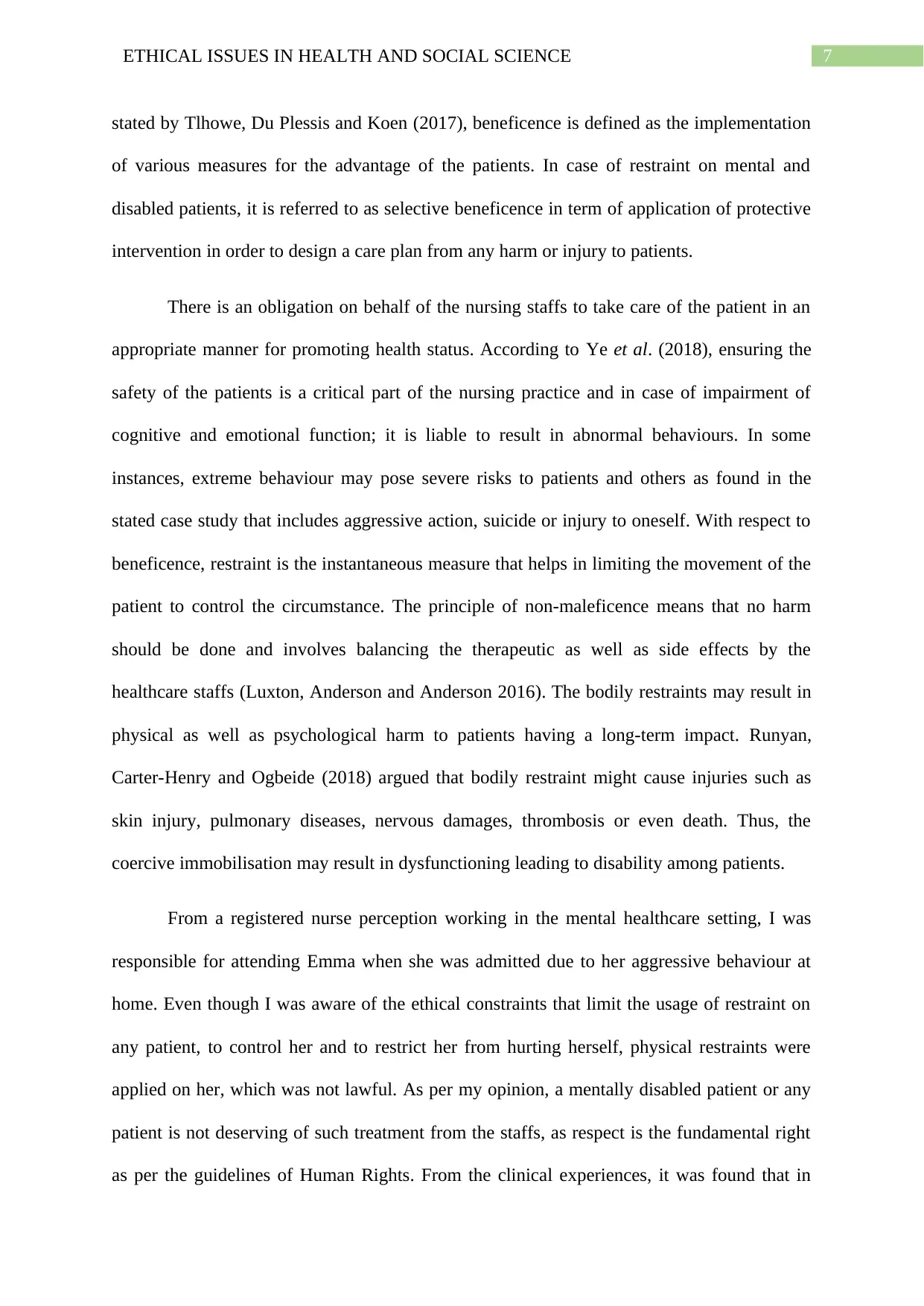
7ETHICAL ISSUES IN HEALTH AND SOCIAL SCIENCE
stated by Tlhowe, Du Plessis and Koen (2017), beneficence is defined as the implementation
of various measures for the advantage of the patients. In case of restraint on mental and
disabled patients, it is referred to as selective beneficence in term of application of protective
intervention in order to design a care plan from any harm or injury to patients.
There is an obligation on behalf of the nursing staffs to take care of the patient in an
appropriate manner for promoting health status. According to Ye et al. (2018), ensuring the
safety of the patients is a critical part of the nursing practice and in case of impairment of
cognitive and emotional function; it is liable to result in abnormal behaviours. In some
instances, extreme behaviour may pose severe risks to patients and others as found in the
stated case study that includes aggressive action, suicide or injury to oneself. With respect to
beneficence, restraint is the instantaneous measure that helps in limiting the movement of the
patient to control the circumstance. The principle of non-maleficence means that no harm
should be done and involves balancing the therapeutic as well as side effects by the
healthcare staffs (Luxton, Anderson and Anderson 2016). The bodily restraints may result in
physical as well as psychological harm to patients having a long-term impact. Runyan,
Carter-Henry and Ogbeide (2018) argued that bodily restraint might cause injuries such as
skin injury, pulmonary diseases, nervous damages, thrombosis or even death. Thus, the
coercive immobilisation may result in dysfunctioning leading to disability among patients.
From a registered nurse perception working in the mental healthcare setting, I was
responsible for attending Emma when she was admitted due to her aggressive behaviour at
home. Even though I was aware of the ethical constraints that limit the usage of restraint on
any patient, to control her and to restrict her from hurting herself, physical restraints were
applied on her, which was not lawful. As per my opinion, a mentally disabled patient or any
patient is not deserving of such treatment from the staffs, as respect is the fundamental right
as per the guidelines of Human Rights. From the clinical experiences, it was found that in
stated by Tlhowe, Du Plessis and Koen (2017), beneficence is defined as the implementation
of various measures for the advantage of the patients. In case of restraint on mental and
disabled patients, it is referred to as selective beneficence in term of application of protective
intervention in order to design a care plan from any harm or injury to patients.
There is an obligation on behalf of the nursing staffs to take care of the patient in an
appropriate manner for promoting health status. According to Ye et al. (2018), ensuring the
safety of the patients is a critical part of the nursing practice and in case of impairment of
cognitive and emotional function; it is liable to result in abnormal behaviours. In some
instances, extreme behaviour may pose severe risks to patients and others as found in the
stated case study that includes aggressive action, suicide or injury to oneself. With respect to
beneficence, restraint is the instantaneous measure that helps in limiting the movement of the
patient to control the circumstance. The principle of non-maleficence means that no harm
should be done and involves balancing the therapeutic as well as side effects by the
healthcare staffs (Luxton, Anderson and Anderson 2016). The bodily restraints may result in
physical as well as psychological harm to patients having a long-term impact. Runyan,
Carter-Henry and Ogbeide (2018) argued that bodily restraint might cause injuries such as
skin injury, pulmonary diseases, nervous damages, thrombosis or even death. Thus, the
coercive immobilisation may result in dysfunctioning leading to disability among patients.
From a registered nurse perception working in the mental healthcare setting, I was
responsible for attending Emma when she was admitted due to her aggressive behaviour at
home. Even though I was aware of the ethical constraints that limit the usage of restraint on
any patient, to control her and to restrict her from hurting herself, physical restraints were
applied on her, which was not lawful. As per my opinion, a mentally disabled patient or any
patient is not deserving of such treatment from the staffs, as respect is the fundamental right
as per the guidelines of Human Rights. From the clinical experiences, it was found that in
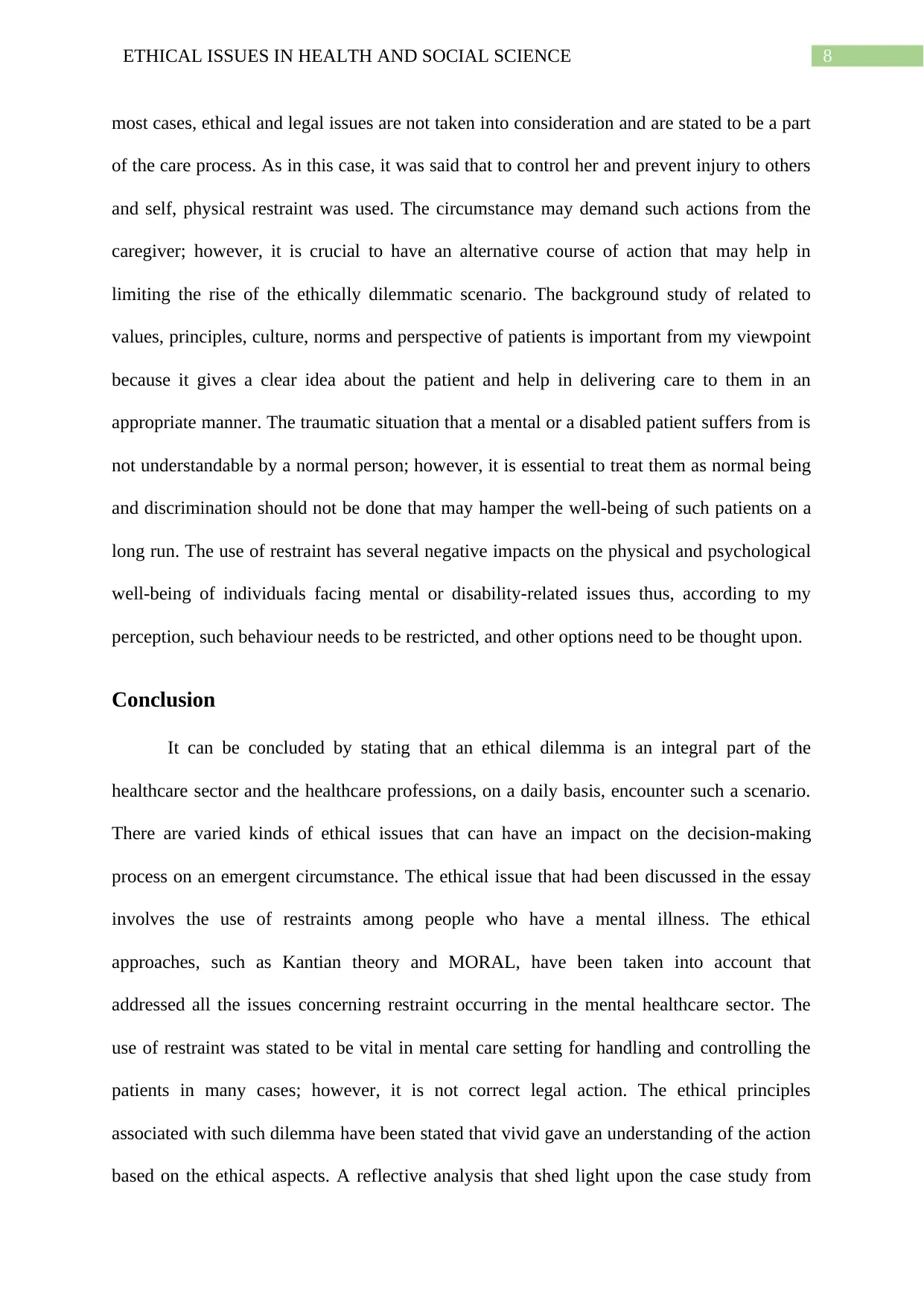
8ETHICAL ISSUES IN HEALTH AND SOCIAL SCIENCE
most cases, ethical and legal issues are not taken into consideration and are stated to be a part
of the care process. As in this case, it was said that to control her and prevent injury to others
and self, physical restraint was used. The circumstance may demand such actions from the
caregiver; however, it is crucial to have an alternative course of action that may help in
limiting the rise of the ethically dilemmatic scenario. The background study of related to
values, principles, culture, norms and perspective of patients is important from my viewpoint
because it gives a clear idea about the patient and help in delivering care to them in an
appropriate manner. The traumatic situation that a mental or a disabled patient suffers from is
not understandable by a normal person; however, it is essential to treat them as normal being
and discrimination should not be done that may hamper the well-being of such patients on a
long run. The use of restraint has several negative impacts on the physical and psychological
well-being of individuals facing mental or disability-related issues thus, according to my
perception, such behaviour needs to be restricted, and other options need to be thought upon.
Conclusion
It can be concluded by stating that an ethical dilemma is an integral part of the
healthcare sector and the healthcare professions, on a daily basis, encounter such a scenario.
There are varied kinds of ethical issues that can have an impact on the decision-making
process on an emergent circumstance. The ethical issue that had been discussed in the essay
involves the use of restraints among people who have a mental illness. The ethical
approaches, such as Kantian theory and MORAL, have been taken into account that
addressed all the issues concerning restraint occurring in the mental healthcare sector. The
use of restraint was stated to be vital in mental care setting for handling and controlling the
patients in many cases; however, it is not correct legal action. The ethical principles
associated with such dilemma have been stated that vivid gave an understanding of the action
based on the ethical aspects. A reflective analysis that shed light upon the case study from
most cases, ethical and legal issues are not taken into consideration and are stated to be a part
of the care process. As in this case, it was said that to control her and prevent injury to others
and self, physical restraint was used. The circumstance may demand such actions from the
caregiver; however, it is crucial to have an alternative course of action that may help in
limiting the rise of the ethically dilemmatic scenario. The background study of related to
values, principles, culture, norms and perspective of patients is important from my viewpoint
because it gives a clear idea about the patient and help in delivering care to them in an
appropriate manner. The traumatic situation that a mental or a disabled patient suffers from is
not understandable by a normal person; however, it is essential to treat them as normal being
and discrimination should not be done that may hamper the well-being of such patients on a
long run. The use of restraint has several negative impacts on the physical and psychological
well-being of individuals facing mental or disability-related issues thus, according to my
perception, such behaviour needs to be restricted, and other options need to be thought upon.
Conclusion
It can be concluded by stating that an ethical dilemma is an integral part of the
healthcare sector and the healthcare professions, on a daily basis, encounter such a scenario.
There are varied kinds of ethical issues that can have an impact on the decision-making
process on an emergent circumstance. The ethical issue that had been discussed in the essay
involves the use of restraints among people who have a mental illness. The ethical
approaches, such as Kantian theory and MORAL, have been taken into account that
addressed all the issues concerning restraint occurring in the mental healthcare sector. The
use of restraint was stated to be vital in mental care setting for handling and controlling the
patients in many cases; however, it is not correct legal action. The ethical principles
associated with such dilemma have been stated that vivid gave an understanding of the action
based on the ethical aspects. A reflective analysis that shed light upon the case study from
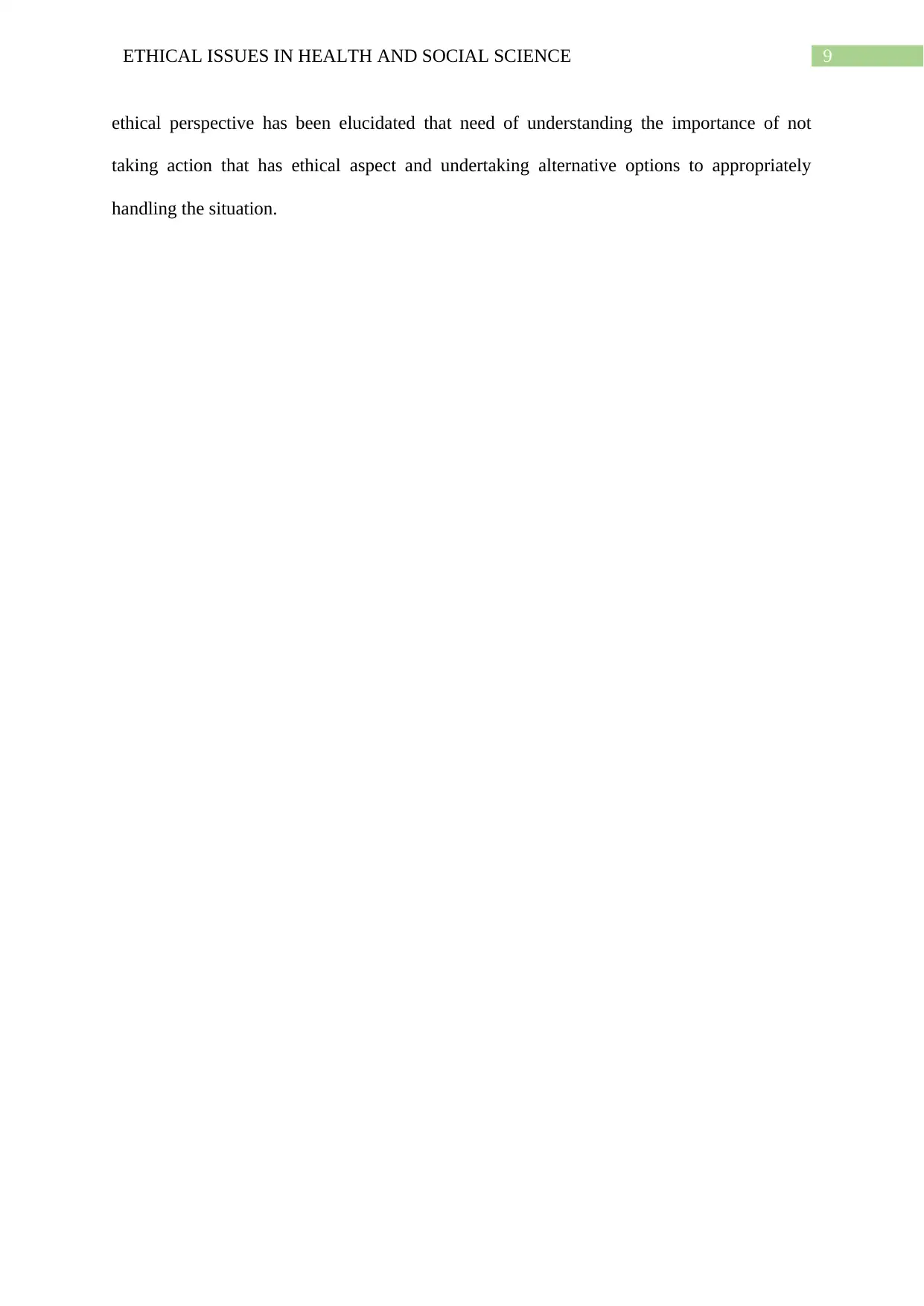
9ETHICAL ISSUES IN HEALTH AND SOCIAL SCIENCE
ethical perspective has been elucidated that need of understanding the importance of not
taking action that has ethical aspect and undertaking alternative options to appropriately
handling the situation.
ethical perspective has been elucidated that need of understanding the importance of not
taking action that has ethical aspect and undertaking alternative options to appropriately
handling the situation.
Secure Best Marks with AI Grader
Need help grading? Try our AI Grader for instant feedback on your assignments.
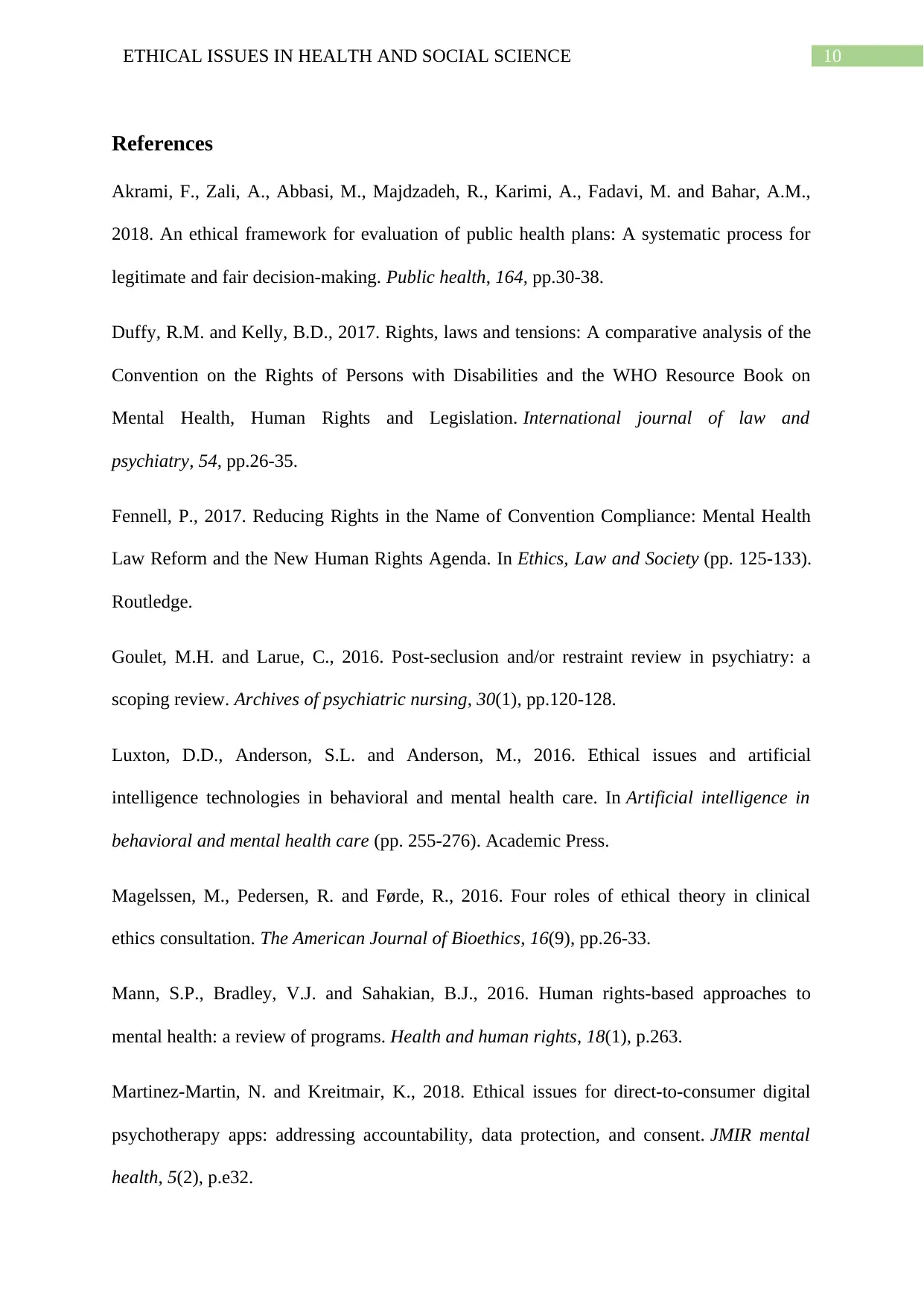
10ETHICAL ISSUES IN HEALTH AND SOCIAL SCIENCE
References
Akrami, F., Zali, A., Abbasi, M., Majdzadeh, R., Karimi, A., Fadavi, M. and Bahar, A.M.,
2018. An ethical framework for evaluation of public health plans: A systematic process for
legitimate and fair decision-making. Public health, 164, pp.30-38.
Duffy, R.M. and Kelly, B.D., 2017. Rights, laws and tensions: A comparative analysis of the
Convention on the Rights of Persons with Disabilities and the WHO Resource Book on
Mental Health, Human Rights and Legislation. International journal of law and
psychiatry, 54, pp.26-35.
Fennell, P., 2017. Reducing Rights in the Name of Convention Compliance: Mental Health
Law Reform and the New Human Rights Agenda. In Ethics, Law and Society (pp. 125-133).
Routledge.
Goulet, M.H. and Larue, C., 2016. Post-seclusion and/or restraint review in psychiatry: a
scoping review. Archives of psychiatric nursing, 30(1), pp.120-128.
Luxton, D.D., Anderson, S.L. and Anderson, M., 2016. Ethical issues and artificial
intelligence technologies in behavioral and mental health care. In Artificial intelligence in
behavioral and mental health care (pp. 255-276). Academic Press.
Magelssen, M., Pedersen, R. and Førde, R., 2016. Four roles of ethical theory in clinical
ethics consultation. The American Journal of Bioethics, 16(9), pp.26-33.
Mann, S.P., Bradley, V.J. and Sahakian, B.J., 2016. Human rights-based approaches to
mental health: a review of programs. Health and human rights, 18(1), p.263.
Martinez-Martin, N. and Kreitmair, K., 2018. Ethical issues for direct-to-consumer digital
psychotherapy apps: addressing accountability, data protection, and consent. JMIR mental
health, 5(2), p.e32.
References
Akrami, F., Zali, A., Abbasi, M., Majdzadeh, R., Karimi, A., Fadavi, M. and Bahar, A.M.,
2018. An ethical framework for evaluation of public health plans: A systematic process for
legitimate and fair decision-making. Public health, 164, pp.30-38.
Duffy, R.M. and Kelly, B.D., 2017. Rights, laws and tensions: A comparative analysis of the
Convention on the Rights of Persons with Disabilities and the WHO Resource Book on
Mental Health, Human Rights and Legislation. International journal of law and
psychiatry, 54, pp.26-35.
Fennell, P., 2017. Reducing Rights in the Name of Convention Compliance: Mental Health
Law Reform and the New Human Rights Agenda. In Ethics, Law and Society (pp. 125-133).
Routledge.
Goulet, M.H. and Larue, C., 2016. Post-seclusion and/or restraint review in psychiatry: a
scoping review. Archives of psychiatric nursing, 30(1), pp.120-128.
Luxton, D.D., Anderson, S.L. and Anderson, M., 2016. Ethical issues and artificial
intelligence technologies in behavioral and mental health care. In Artificial intelligence in
behavioral and mental health care (pp. 255-276). Academic Press.
Magelssen, M., Pedersen, R. and Førde, R., 2016. Four roles of ethical theory in clinical
ethics consultation. The American Journal of Bioethics, 16(9), pp.26-33.
Mann, S.P., Bradley, V.J. and Sahakian, B.J., 2016. Human rights-based approaches to
mental health: a review of programs. Health and human rights, 18(1), p.263.
Martinez-Martin, N. and Kreitmair, K., 2018. Ethical issues for direct-to-consumer digital
psychotherapy apps: addressing accountability, data protection, and consent. JMIR mental
health, 5(2), p.e32.
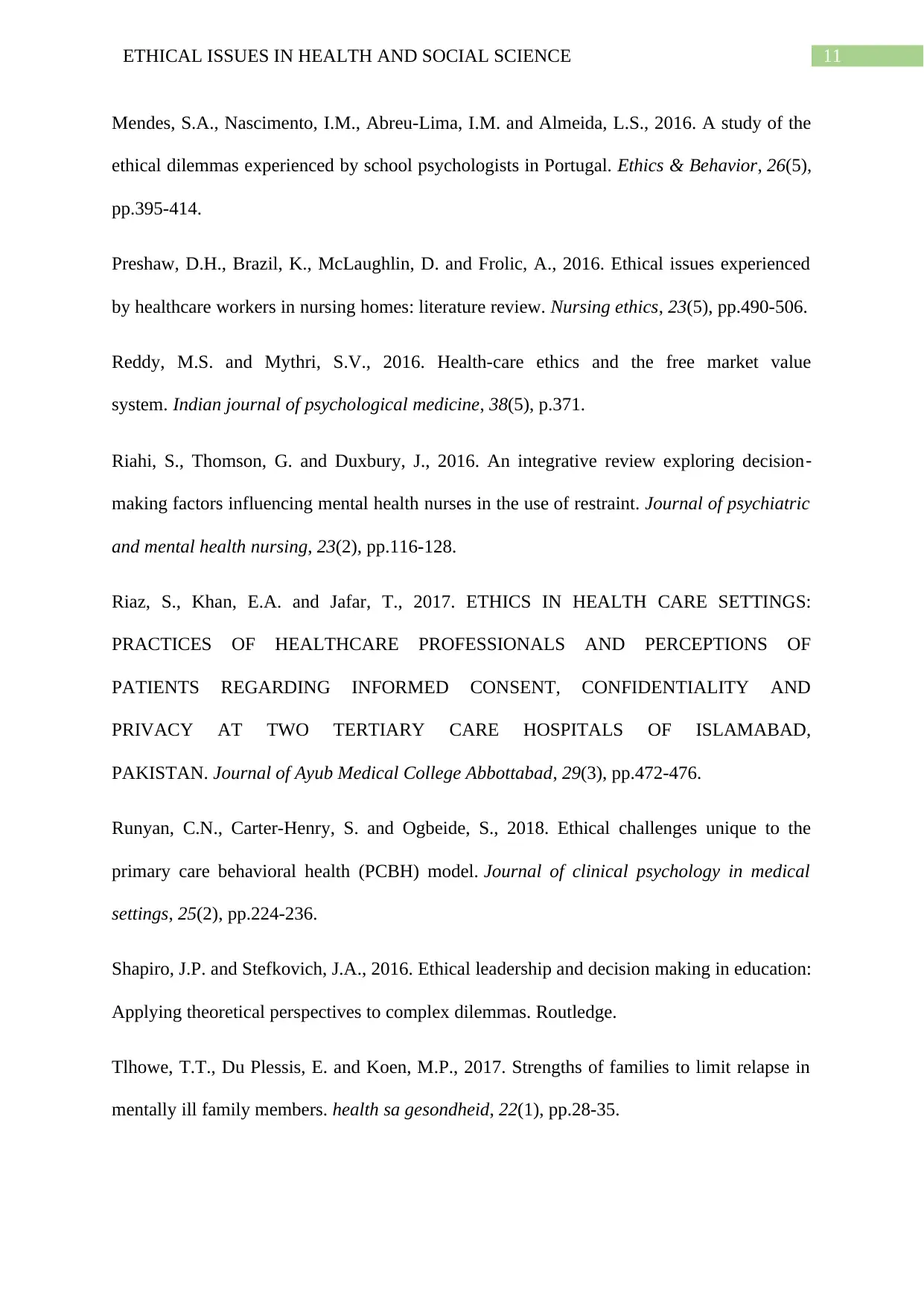
11ETHICAL ISSUES IN HEALTH AND SOCIAL SCIENCE
Mendes, S.A., Nascimento, I.M., Abreu-Lima, I.M. and Almeida, L.S., 2016. A study of the
ethical dilemmas experienced by school psychologists in Portugal. Ethics & Behavior, 26(5),
pp.395-414.
Preshaw, D.H., Brazil, K., McLaughlin, D. and Frolic, A., 2016. Ethical issues experienced
by healthcare workers in nursing homes: literature review. Nursing ethics, 23(5), pp.490-506.
Reddy, M.S. and Mythri, S.V., 2016. Health-care ethics and the free market value
system. Indian journal of psychological medicine, 38(5), p.371.
Riahi, S., Thomson, G. and Duxbury, J., 2016. An integrative review exploring decision‐
making factors influencing mental health nurses in the use of restraint. Journal of psychiatric
and mental health nursing, 23(2), pp.116-128.
Riaz, S., Khan, E.A. and Jafar, T., 2017. ETHICS IN HEALTH CARE SETTINGS:
PRACTICES OF HEALTHCARE PROFESSIONALS AND PERCEPTIONS OF
PATIENTS REGARDING INFORMED CONSENT, CONFIDENTIALITY AND
PRIVACY AT TWO TERTIARY CARE HOSPITALS OF ISLAMABAD,
PAKISTAN. Journal of Ayub Medical College Abbottabad, 29(3), pp.472-476.
Runyan, C.N., Carter-Henry, S. and Ogbeide, S., 2018. Ethical challenges unique to the
primary care behavioral health (PCBH) model. Journal of clinical psychology in medical
settings, 25(2), pp.224-236.
Shapiro, J.P. and Stefkovich, J.A., 2016. Ethical leadership and decision making in education:
Applying theoretical perspectives to complex dilemmas. Routledge.
Tlhowe, T.T., Du Plessis, E. and Koen, M.P., 2017. Strengths of families to limit relapse in
mentally ill family members. health sa gesondheid, 22(1), pp.28-35.
Mendes, S.A., Nascimento, I.M., Abreu-Lima, I.M. and Almeida, L.S., 2016. A study of the
ethical dilemmas experienced by school psychologists in Portugal. Ethics & Behavior, 26(5),
pp.395-414.
Preshaw, D.H., Brazil, K., McLaughlin, D. and Frolic, A., 2016. Ethical issues experienced
by healthcare workers in nursing homes: literature review. Nursing ethics, 23(5), pp.490-506.
Reddy, M.S. and Mythri, S.V., 2016. Health-care ethics and the free market value
system. Indian journal of psychological medicine, 38(5), p.371.
Riahi, S., Thomson, G. and Duxbury, J., 2016. An integrative review exploring decision‐
making factors influencing mental health nurses in the use of restraint. Journal of psychiatric
and mental health nursing, 23(2), pp.116-128.
Riaz, S., Khan, E.A. and Jafar, T., 2017. ETHICS IN HEALTH CARE SETTINGS:
PRACTICES OF HEALTHCARE PROFESSIONALS AND PERCEPTIONS OF
PATIENTS REGARDING INFORMED CONSENT, CONFIDENTIALITY AND
PRIVACY AT TWO TERTIARY CARE HOSPITALS OF ISLAMABAD,
PAKISTAN. Journal of Ayub Medical College Abbottabad, 29(3), pp.472-476.
Runyan, C.N., Carter-Henry, S. and Ogbeide, S., 2018. Ethical challenges unique to the
primary care behavioral health (PCBH) model. Journal of clinical psychology in medical
settings, 25(2), pp.224-236.
Shapiro, J.P. and Stefkovich, J.A., 2016. Ethical leadership and decision making in education:
Applying theoretical perspectives to complex dilemmas. Routledge.
Tlhowe, T.T., Du Plessis, E. and Koen, M.P., 2017. Strengths of families to limit relapse in
mentally ill family members. health sa gesondheid, 22(1), pp.28-35.
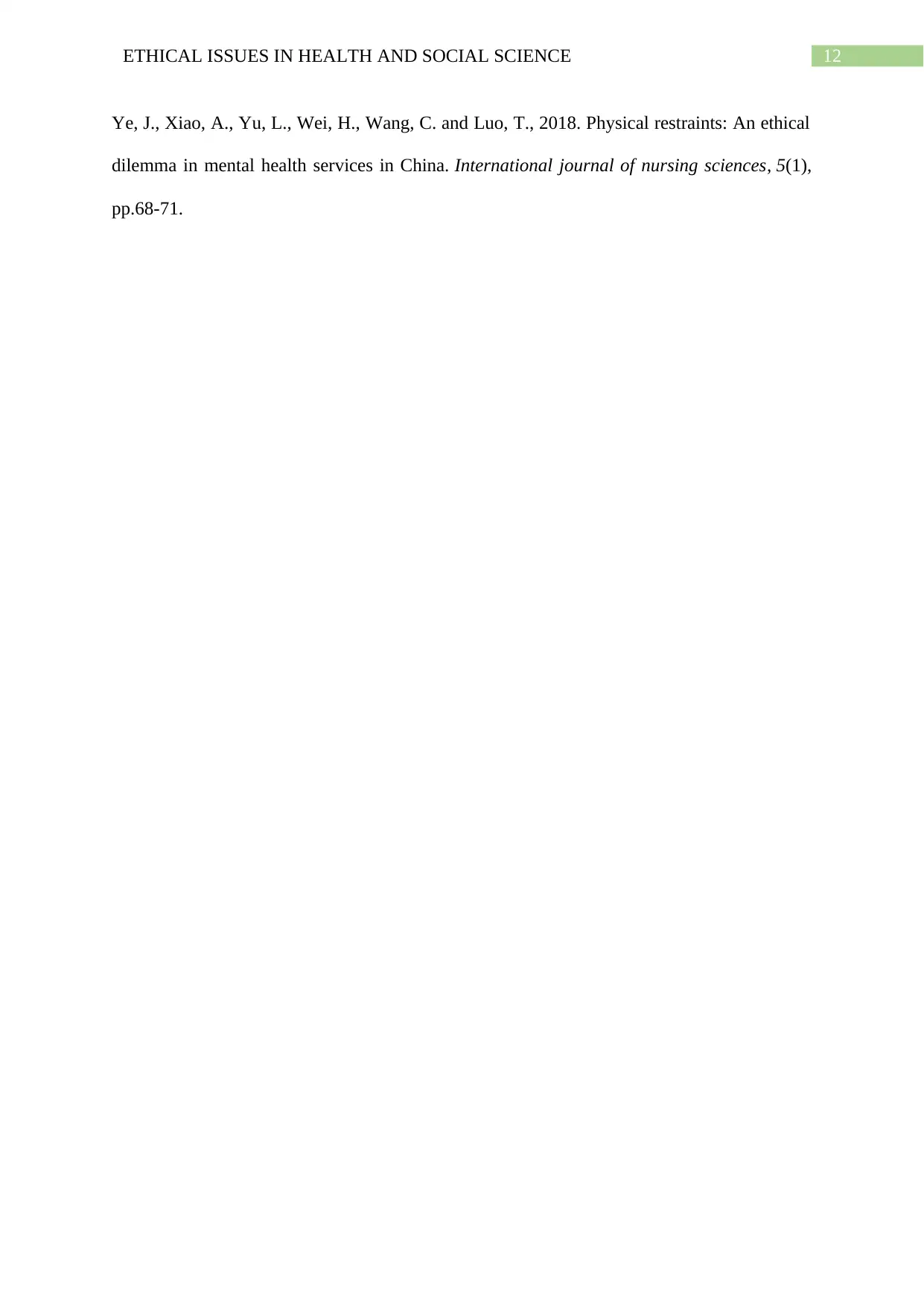
12ETHICAL ISSUES IN HEALTH AND SOCIAL SCIENCE
Ye, J., Xiao, A., Yu, L., Wei, H., Wang, C. and Luo, T., 2018. Physical restraints: An ethical
dilemma in mental health services in China. International journal of nursing sciences, 5(1),
pp.68-71.
Ye, J., Xiao, A., Yu, L., Wei, H., Wang, C. and Luo, T., 2018. Physical restraints: An ethical
dilemma in mental health services in China. International journal of nursing sciences, 5(1),
pp.68-71.
1 out of 13
Related Documents
Your All-in-One AI-Powered Toolkit for Academic Success.
+13062052269
info@desklib.com
Available 24*7 on WhatsApp / Email
![[object Object]](/_next/static/media/star-bottom.7253800d.svg)
Unlock your academic potential
© 2024 | Zucol Services PVT LTD | All rights reserved.





